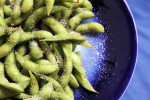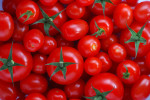
Food & Drink
Soy bean foods may protect older women against osteoporosis – new findings
 Eating a diet rich in soy protein and isoflavones can protect older women from bone weakening and osteoporosis, according to the results of a preliminary study presented at the Society for Endocrinology Annual Conference in Edinburgh. Continue reading
Eating a diet rich in soy protein and isoflavones can protect older women from bone weakening and osteoporosis, according to the results of a preliminary study presented at the Society for Endocrinology Annual Conference in Edinburgh. Continue reading
Nutritional needs for bone health change as we age, says new scientific review
 Whatever our age, nutrition makes a difference to bone health and influences whether we live independent, mobile, fracture-free lives in our more senior years, experts highlight in Osteoporosis International.
Whatever our age, nutrition makes a difference to bone health and influences whether we live independent, mobile, fracture-free lives in our more senior years, experts highlight in Osteoporosis International.
Leading bone and nutrition experts have summarised the latest studies, trials and guidelines about the nutritional needs of mothers, children, adolescents, adults and older people, in relation to developing and maintaining a healthy skeleton. Continue reading
Increasing calcium intake may not improve bone health of older people suggests research in leading journal
 Bone density and fracture risk of older people may not improve with increased calcium intake, according to two new studies in the British Medical Journal.
Bone density and fracture risk of older people may not improve with increased calcium intake, according to two new studies in the British Medical Journal.
The average daily calcium intake in older people in Western countries is around 700mg–900mg a day. The NHS recommends that adults need a daily intake of 700mg and osteoporosis experts suggest that if people are taking an osteoporosis drug treatment, they may benefit from calcium intake of around 1000mg a day. Continue reading
Link found between dried plums – prunes – and healthy bones
 Two new studies that suggest that prunes help to support healthy bones and may even promote attainment of peak bone mass, have been presented at The International Symposium on Nutritional Aspects of Osteoporosis 2015.
Two new studies that suggest that prunes help to support healthy bones and may even promote attainment of peak bone mass, have been presented at The International Symposium on Nutritional Aspects of Osteoporosis 2015.
New research into bone health is important because over three million people in the UK are estimated to have osteoporosis. And every year people in the UK suffer more than 300,000 fragility fractures, that’s one every two minutes. Continue reading
Tomatoes can be a gout trigger – new study backs up anecdotal evidence
 People who claim that eating tomatoes can cause their gout to flare-up are welcoming new research that suggests there may be a biological basis for their experiences.
People who claim that eating tomatoes can cause their gout to flare-up are welcoming new research that suggests there may be a biological basis for their experiences.
A research group surveyed 2051 people with clinically verified gout. Of these people 71% reported having one or more food triggers, and tomatoes were listed as a trigger in 20% of these cases. Continue reading
